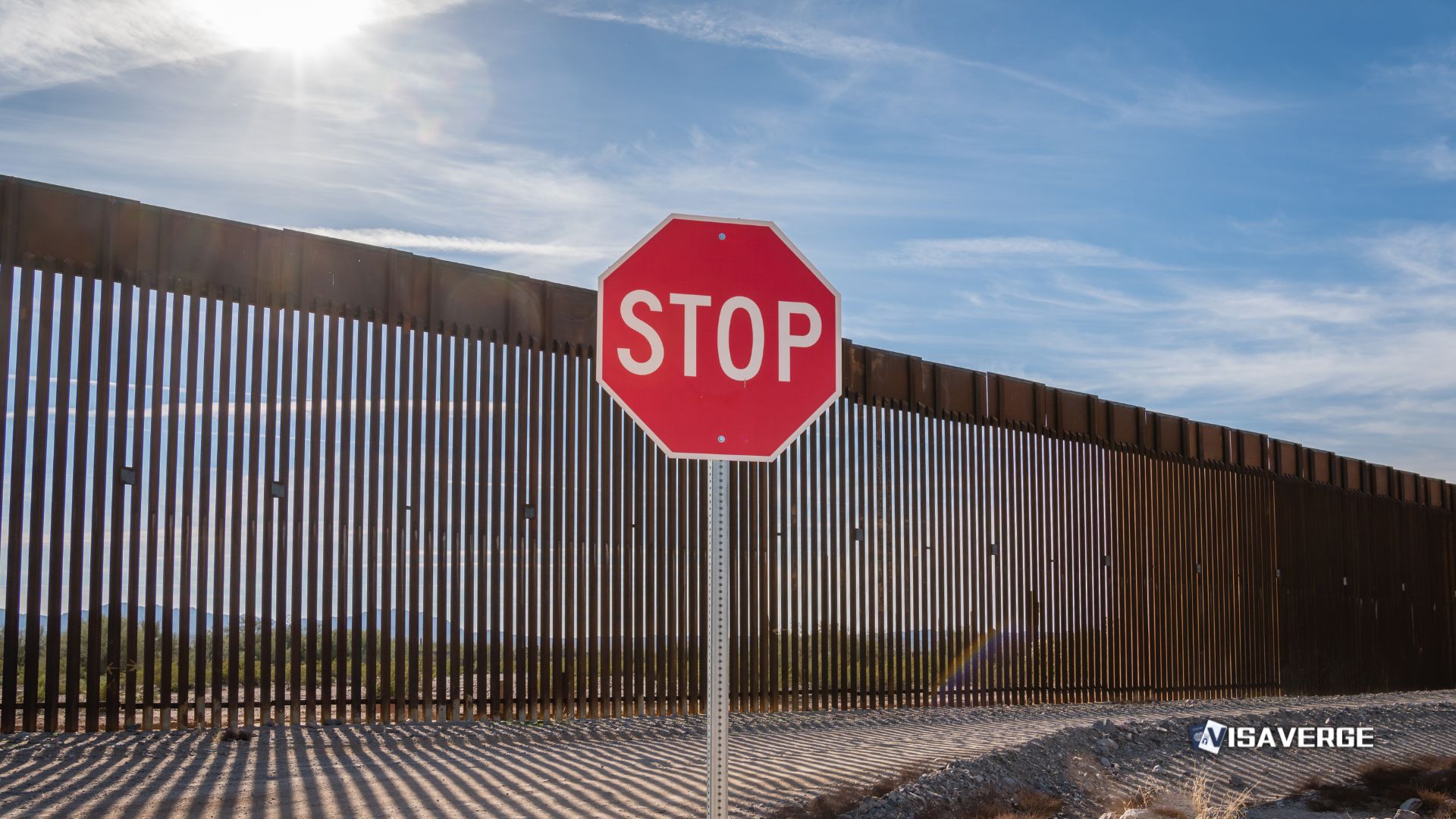Key Takeaways
• The ACLU filed a lawsuit on February 3, 2025, challenging Trump’s asylum ban at the U.S.-Mexico border.
• The lawsuit claims the asylum ban violates U.S. law, international treaties, and protections under the 1951 Refugee Convention and 1967 Protocol.
• The executive order ends all legal avenues for asylum seekers, sparking legal battles with potentially significant implications for U.S. immigration policy.
On February 3, 2025, the American Civil Liberties Union (ACLU) and several other immigration advocacy groups filed a high-profile lawsuit against the Trump administration, challenging its sweeping ban on asylum access at the southern border of the United States 🇺🇸. The executive order, issued by President Trump, not only suspends the physical entry of migrants, but it also eliminates their right to seek asylum—a move the lawsuit describes as both unlawful and dangerously unprecedented. The legal action, involving various major organizations, argues that this policy places individuals fleeing violence and persecution in grave jeopardy.
This lawsuit carries enormous legal and humanitarian significance. It addresses fundamental questions about the rights of asylum seekers under U.S. law and international agreements. It also underscores mounting divisions in U.S. immigration policy and its implications for migrants, border communities, and the broader values the nation claims to uphold.

Legal Challenges: The Heart of the Complaint
The plaintiffs, led by the ACLU, state that the administration’s actions violate laws enacted by Congress and international treaties signed by the United States. A key feature of U.S. law is the right for individuals to request asylum if they fear persecution in their home countries. The lawsuit contends that President Trump’s executive order overrides this statutory protection, forcing vulnerable people to face severe harm without a proper legal process.
Lee Gelernt, deputy director of the ACLU’s Immigrants’ Rights Project, captured the gravity of the issue, saying, “This is an unprecedented power grab that will put countless lives in danger. No president has the authority to unilaterally override the protections Congress has afforded those fleeing danger.” This statement reflects the central accusation that the administration’s action violates both domestic law and the principles of due process.
There’s also an argument that this executive order violates internationally-recognized rights outlined in treaties like the 1951 Refugee Convention and its 1967 Protocol, which the U.S. has committed to honoring. These agreements obligate countries to protect refugees and asylum seekers, ensuring they are not returned to places where they might face threats of persecution or torture. By directly contravening these obligations, the plaintiffs argue, the order undermines the global framework for refugee protection.
A Different Approach, a Different Scale
While the Trump administration has previously sought to restrict asylum access—such as restricting eligibility to individuals crossing the border at official points of entry—this new measure is far more extreme. For the first time, asylum seekers are left with no legal avenues to request protection, effectively overturning long-standing legal protocols. The administration’s reliance on Section 212(f) of the Immigration and Nationality Act to justify this action has faced strong criticism. Critics argue the provision, which allows the president to limit entry of specific noncitizens deemed a risk to U.S. interests, is being misused to target an entire class of people.
Richard Caldarone, senior litigation attorney at the National Immigrant Justice Center, denounced the measure as “the latest flagrantly illegal attempt by the executive branch to end humanitarian protection at the U.S.-Mexico border.” He insisted that immigration laws do not grant the president unchecked authority to sideline Congress or disregard treaty commitments on protecting asylum seekers.
This blanket denial of asylum claims marks a significant departure from prior restrictions. It signals the administration’s escalating effort to close the southern border entirely to asylum seekers. Advocates argue such a move is not only unlawful but likely to have devastating consequences for public safety, the rule of law, and America’s reputation on the international stage.
Humanitarian Impacts: Who Pays the Price?
The consequences of this asylum ban stretch well beyond the courtroom. The plaintiffs highlight that thousands of people, including families and children, are now left without protection from dire threats. Many of these individuals are fleeing war zones, gang violence, and political persecution. Denying them even the opportunity to present their claims for shelter exposes them to potential abuse, exploitation, or death.
The lawsuit also raises concerns about false rhetoric that frames border immigration as an “invasion.” Jennifer Babaie, director of advocacy and legal services of Las Americas Immigrant Advocacy Center, stated, “Spreading falsehoods about an ‘invasion’ at our border only fuels fear, aiming to dismantle the entire asylum process and weaponize our immigration laws.” Such rhetoric, which underpins the administration’s policy justification, risks dehumanizing migrants while escalating anti-immigrant sentiment.
Beyond the immediate threats faced by asylum seekers, this policy also places enormous strain on border communities. These areas may now face surges in displaced individuals with no legal pathways or access to essential resources. Critics argue that such outcomes represent a broader failure to uphold humanitarian standards and compassion.
Historical Context: Challenging America’s Reputation
The lawsuit situates this controversial policy within a historical framework. Since its founding, America has been regarded as a sanctuary for those fleeing oppression. The Statue of Liberty has often been invoked as a symbol of this ethos. But as Scott Michelman, legal director at the ACLU of the District of Columbia, explained, “Trump’s attempted border shutdown is an affront to our history and our values, and it will impose incalculable suffering on refugees fleeing for their lives.” These words capture growing concerns that such policies represent a retreat from the country’s long-standing commitments.
The Trump administration has faced lawsuits before for decisions on immigration matters, especially during its first term. Advocates warn this executive order echoes past attempts to rewrite immigration law through unilateral action—efforts that courts have previously invalidated. Melissa Crow, director of litigation at the Center for Gender & Refugee Studies, stated, “Just as he did in his first term, the president is attempting to rewrite our laws by executive fiat and impose an illegal policy of mass expulsions.” Her remarks underscore concerns that abrupt policy changes challenge democratic checks and balances enshrined within the Constitution.
The End of Prior Asylum Programs
The lawsuit also points to the stark contrast between this new policy and the programs implemented by the Biden administration. During the prior administration, a more measured approach allowed 1,450 individuals per day to schedule appointments at Mexican border crossings to request asylum legally. While admittedly restrictive, this program still gave asylum seekers an avenue to pursue protections. President Trump ended this system on his first day back in office, shifting to a policy of indiscriminate denial instead.
By targeting all asylum seekers—irrespective of how or why they arrived—this executive order leaves thousands stranded with no possibilities for recourse. This lack of distinction, say advocates, is both unfair and harmful, exacerbating the already complex crisis at the southern border.
Criticisms and Broader Implications
Critics of asylum reforms often argue that most migrants seeking protection fail to meet the eligibility requirements under asylum law. However, this argument does not justify a blanket move to deny every individual the right to make a claim. Javier Hidalgo, legal director at RAICES, condemned the executive order as “using racist pretext as a means to further the president’s cowardly xenophobic agenda.” For many, these policies reflect deeper ideologies aimed at curbing immigration altogether rather than addressing legitimate security concerns.
The lawsuit was filed in the U.S. District Court in Washington, D.C., setting off what is likely to be a contentious legal battle. If successful, the case could deliver a decisive blow to the administration’s broader immigration agenda. Conversely, a ruling in favor of the government could embolden similarly restrictive measures in the future.
Moving Forward
As these legal proceedings unfold, the broader question of how America defines its immigration system remains in sharp focus. Will it continue to serve as a haven for those in need, or will it rewrite its policies in ways that many believe contravene its values as a nation of immigrants? Analysis from VisaVerge.com suggests that this case may play a pivotal role in shaping U.S. asylum law for years to come. As readers seek deeper understanding, they can access the latest case updates on the official website of the U.S. District Court at uscourts.gov.
In challenging this executive order, the ACLU and its coalition aim to protect legal pathways for asylum seekers and hold the government accountable for upholding the nation’s constitutional and ethical responsibilities. For affected individuals and legal advocates, these decisions could be life-defining.
Learn Today
Asylum → Protection granted to individuals fleeing persecution, allowing them to seek safety in a foreign country.
Executive Order → A directive issued by the U.S. president with the force of law, typically without requiring Congressional approval.
1951 Refugee Convention → An international treaty defining refugees’ rights and countries’ obligations to protect individuals fleeing persecution.
Immigration and Nationality Act (INA) → U.S. law governing immigration and citizenship, including rules for the entry and removal of noncitizens.
Due Process → Legal principle ensuring fair treatment in judicial or administrative proceedings, protecting individuals’ rights under the law.
This Article in a Nutshell
On February 3, 2025, the ACLU sued the Trump administration over its asylum ban, calling it illegal and life-threatening. Critics argue the order violates U.S. law and international treaties, leaving vulnerable migrants without protection. This landmark case challenges America’s commitment to humanitarian principles and could reshape asylum rights for generations.
— By VisaVerge.com
Read more:
• National Audit Office Finds Millions Wasted on Asylum Housing in UK
• Labour Government Blocks SNP Plan on Work Rights for Asylum Seekers
• ACLU Sues Trump Over New Asylum Ban in First Legal Challenge
• Lives in Limbo: Asylum Seekers Trapped at Poland-Belarus Border
• Ireland’s Asylum Accommodation Costs Surge to €84 Per Day












